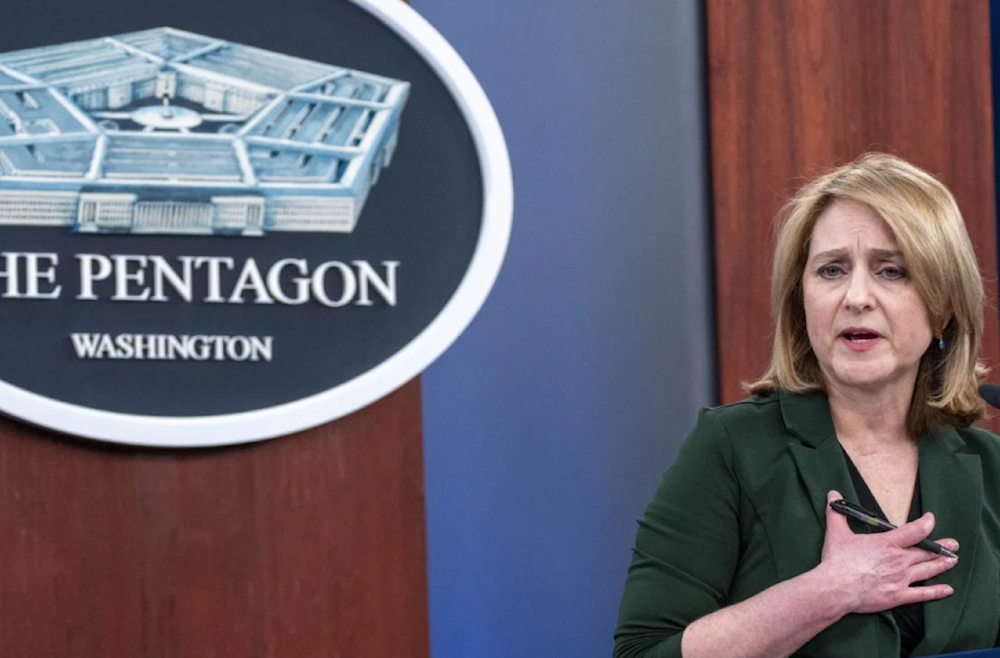Pentagon admits it has no funds left for Middle East buildup
According to Politico, the temporary budget freezes funding at last year's levels.
-

US Deputy Secretary of Defense Kathleen Hicks during an address at the Pentagon (AP)
Since the United States has been aiding "Israel" in its relentless manic aggression on Gaza after October 7, the Defense Department has dispatched an extra aircraft carrier strike group, air defenses, fighter jets, and hundreds of troops to the Middle East in an effort to prevent the situation from escalating into a regional war. However, according to Politico, the main problem in this framework is congressional dysfunction, which means that the Pentagon is unable to fund the buildup.
The federal government's temporary financing happens to include the military as well, and this freezes expenditure at the same levels as the previous year. Because the personnel transfers in the Middle East were unplanned, the Pentagon was forced to draw funds from existing operations and maintenance accounts, according to DOD spokesperson Chris Sherwood. President Joe Biden approved a temporary bill last month to keep the government operational until the end of the fiscal year.
According to Sherwood, this means drills and deployments scheduled for the year will have less funding, and some contractual payments may be delayed.
He detailed that “neither the basic budget proposal nor the fiscal year 2024 supplemental request contained financing for US-Israel missions," adding, "We're taking it out of hide."
The buildup has included prolonging the presence of the Gerald R. Ford Carrier Strike Group off the coast of "Israel" and has forced military departments and US Central Command to reassess the requirements for current and future operations based on the developing conflict, he added.
Read more: US Eisenhower Carrier Strike Group enter Gulf waters: CENTCOM
As of Tuesday afternoon, the Department of Defense stated that it was still working on issuing an estimate of the entire cost of US support for "Israel's" war on Gaza.
Every year, Pentagon officials warn about the impact of temporary budget measures on military preparedness. Operating under a temporary measure restricts the agency from initiating new programs or spending more than the previous year's budget.
The DOD is extra strained now with the US funding two wars at once. Ukraine's and "Israel's".
During a Washington event, Deputy Defense Secretary Kathleen Hicks expressed that this comes with "significant consequence", saying, "[You] can't buy back the time. You just can't."
Congress faces hurdles in push for aid package to Ukraine, 'Israel'
Congress is working toward passing a foreign aid package by the year's end to provide essential assistance to key US proxies, including "Israel" and Ukraine, according to lawmakers.
With only three weeks left on the legislative calendar to craft a bipartisan deal, many question the members' capacity to achieve their goal.
In the past, President Joe Biden's emergency request for foreign aid has encountered obstacles in the House and Senate regarding how to proceed.
Both houses are currently entangled in disputes over matters such as "Israel's" war on Gaza, identifying funding sources for the requested aid, and addressing immigration reform. A clear path to an agreement has yet to emerge.
"These are very tough and delicate negotiations," Rep. Mario Diaz-Balart, R-Fla., a senior member of the House Appropriations Committee, told reporters on Nov. 15 before the House went home for the Thanksgiving holiday. Diaz-Balart acknowledged the existence of "bipartisan support" for certain aspects of Biden's request but emphasized that "the devil's in the details."
A bipartisan bill focused solely on aid for "Israel" has come to a standstill, in part owing to the inclusion of an offset provision by House Republicans, led by Speaker Mike Johnson, R-La., which proposes funding the assistance by making cuts to the Internal Revenue Service (IRS) budget - a proposition met with resistance from Democrats.
On the other hand, assistance to Ukraine has experienced waning support among Republicans. Several GOP lawmakers have tied aid to Ukraine to the issue of immigration reform, a longstanding policy challenge that Congress has grappled with for over a decade. The White House maintains that addressing immigration reform should be handled through standalone legislation.

 4 Min Read
4 Min Read








